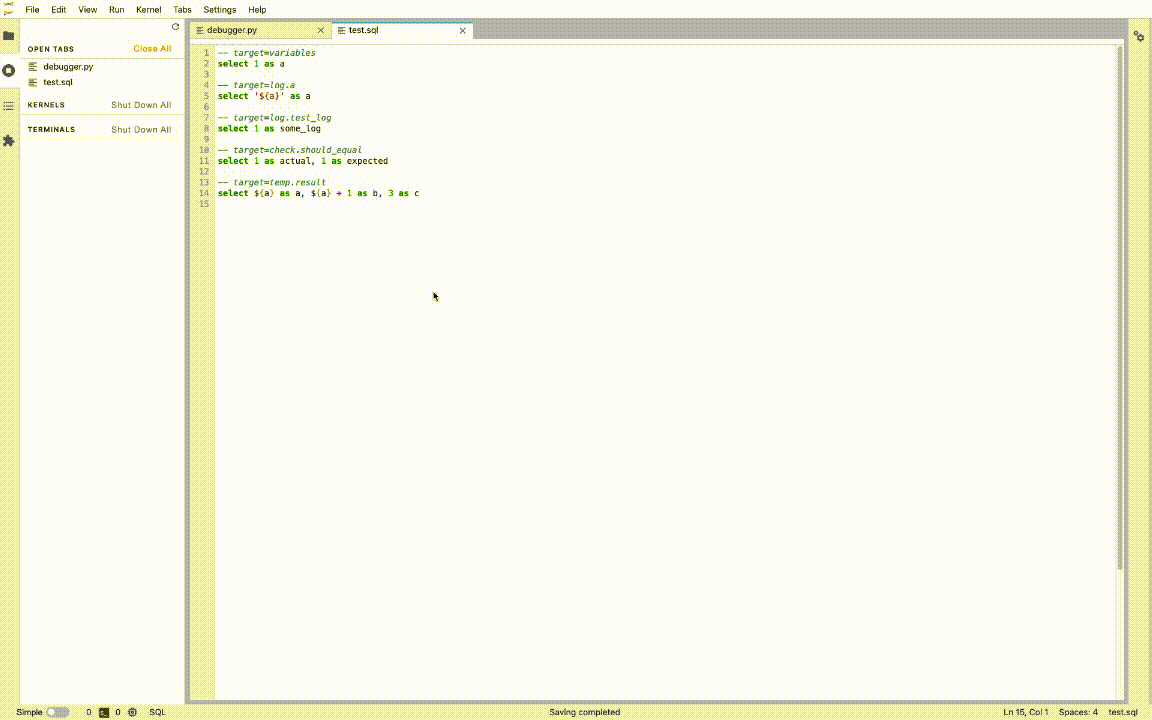Easy SQL is built to ease the data ETL development process. With Easy SQL, you can develop your ETL in SQL in an imperative way. It defines a few simple syntax on top of standard SQL, with which SQL could be executed one by one. Easy SQL also provides a processor to handle all the new syntax. Since this is SQL agnostic, any SQL engine could be plugged-in as a backend. There are built-in support for several popular SQL engines, including SparkSQL, PostgreSQL, Clickhouse, FlinkSQL, Aliyun Maxcompute, Google BigQuery. More will be added in the near future.
- Docs: https://easy-sql.readthedocs.io/
- Enterprise extended product: https://data-workbench.com/
Install Easy SQL using pip: python3 -m pip install 'easy-sql-easy-sql[extra,extra]'
Currently we are providing below extras, choose according to your need:
- cli
- linter
- spark
- pg
- clickhouse
We also provide flink backend, but because of dependency confliction between pyspark and apache-flink, you need to install the flink backend dependencies manually with the following command python3 -m pip install apache-flink.
Usually we read data from some data source and write data to some other system using flink with different connectors. So we need to download some jars for the used connectors as well. Refer here to get more information and here to download the required connectors.
Internally we use poetry to manage the dependencies. So make sure you have installed it. Package could be built with the following make command: make package-pip or just poetry build.
After the above command, there will be a file named easy_sql*.whl generated in the dist folder.
You can install it with command python3 -m pip install dist/easy_sql*.whl[extra] or just poetry install -E 'extra extra'.
Install easy_sql with spark as the backend: python3 -m pip install 'easy-sql-easy-sql[spark,cli]'.
Create a file named sample_etl.spark.sql with content as below:
-- prepare-sql: drop database if exists sample cascade
-- prepare-sql: create database sample
-- prepare-sql: create table sample.test as select 1 as id, '1' as val
-- target=variables
select true as __create_output_table__
-- target=variables
select 1 as a
-- target=log.a
select '${a}' as a
-- target=log.test_log
select 1 as some_log
-- target=check.should_equal
select 1 as actual, 1 as expected
-- target=temp.result
select
${a} as id, ${a} + 1 as val
union all
select id, val from sample.test
-- target=output.sample.result
select * from result
-- target=log.sample_result
select * from sample.resultRun it with command:
bash -c "$(python3 -m easy_sql.data_process -f sample_etl.spark.sql -p)"You need to start a postgres instance first.
If you have docker, run the command below:
docker run -d --name postgres -p 5432:5432 -e POSTGRES_PASSWORD=123456 postgresCreate a file named sample_etl.postgres.sql with content as the test file here.
Make sure that you have install the corresponding backend with python3 -m pip install 'easy-sql-easy-sql[cli,pg]'
Run it with command:
PG_URL=postgresql://postgres:123456@localhost:5432/postgres python3 -m easy_sql.data_process -f sample_etl.postgres.sqlYou need to start a clickhouse instance first.
If you have docker, run the command below:
docker run -d --name clickhouse -p 9000:9000 yandex/clickhouse-server:20.12.5.18Create a file named sample_etl.clickhouse.sql with content as the test file here.
Make sure that you have install the corresponding backend with python3 -m pip install 'easy-sql-easy-sql[cli,clickhouse]'
Run it with command:
CLICKHOUSE_URL=clickhouse+native://default@localhost:9000 python3 -m easy_sql.data_process -f sample_etl.clickhouse.sqlBecause of dependency conflictions between pyspark and apache-flink, you need to install flink manually with command python3 -m pip install apache-flink.
After the installation, you need to add flink commands directory to PATH environment variable to make flink commands discoverable by bash. To do it, execute the commands below:
export FLINK_HOME=$(python3 -m pyflink.find_flink_home)
export PATH=$FLINK_HOME/bin:$PATH
export PYFLINK_CLIENT_EXECUTABLE=python3 # Set Python interpreter for flink client.You can add these commands to your .bashrc or .zshrc file for convenience.
Since there are many connectors for flink, you need to choose which connector to use before starting.
As an example, if you want to read or write data to postgres, then you need to start a postgres instance first.
If you have docker, run the command below:
docker run -d --name postgres -p 5432:5432 -e POSTGRES_PASSWORD=123456 postgresDownload the required jars as below:
mkdir -pv test/flink/jars
wget -P test/flink/jars https://repo1.maven.org/maven2/org/apache/flink/flink-connector-jdbc/1.15.1/flink-connector-jdbc-1.15.1.jar
wget -P test/flink/jars https://repo1.maven.org/maven2/org/postgresql/postgresql/42.2.14/postgresql-42.2.14.jarCreate a file named sample_etl.flink.postgres.sql with content as the test file here.
Create a connector configuration file named sample_etl.flink_tables_file.yml with content as the test configuration file here.
Run it with command:
bash -c "$(python3 -m easy_sql.data_process -f sample_etl.flink.postgres.sql -p)"There are a few other things to know about flink, click here to get more information.
The usage is similar, please refer to API doc here.
Easy SQL can be used as a very light-weight library. If you'd like to run ETL programmatically in your code. Please refer to the code snippets below:
from pyspark.sql import SparkSession
from easy_sql.sql_processor import SqlProcessor
from easy_sql.sql_processor.backend import SparkBackend
if __name__ == '__main__':
spark = SparkSession.builder.enableHiveSupport().getOrCreate()
backend = SparkBackend(spark)
sql = '''
-- target=log.some_log
select 1 as a
'''
sql_processor = SqlProcessor(backend, sql)
sql_processor.run()More sample code about other backends could be referred here
We recommend debugging ETLs from jupyter. You can follow the steps below to start debugging your ETL.
-
Install jupyter first with command
python3 -m pip install jupyterlab. -
Create a file named
debugger.pywith contents like below:
A more detailed sample could be found here.
from typing import Dict, Any
def create_debugger(sql_file_path: str, vars: Dict[str, Any] = None, funcs: Dict[str, Any] = None):
from pyspark.sql import SparkSession
from easy_sql.sql_processor.backend import SparkBackend
from easy_sql.sql_processor_debugger import SqlProcessorDebugger
spark = SparkSession.builder.enableHiveSupport().getOrCreate()
backend = SparkBackend(spark)
debugger = SqlProcessorDebugger(sql_file_path, backend, vars, funcs)
return debugger-
Create a file named
test.sqlwith contents as here. -
Then start jupyter lab with command:
jupyter lab. -
Start debugging like below:
We've created an extension for VS Code to ease the development of ETL in Easy SQL. A bunch of language features are provided, e.g. syntax highlight, code completion, diagnostics features etc. You can search Easy SQL in extension marketplace, or click here to get more information.
We recommended to install the extension to develop ETL in Easy SQL.
Please submit PR.

